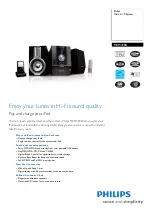
Owner's Manual
3
Part No. SW0722 Rev. A 05/09
©2009 LOUD Technologies Inc. All Rights Reserved.
Loosely based on a dream sequence in which the technical writer is given keys to a
sports car of his choice, unlimited gas, and closed roads. The dream suddenly ends and
reality kicks in. A mixer manual to write, a mixer manual to write!
Set the levels
It’s not even necessary to hear what you’re doing to
set optimal levels. But if you’d like to: Plug in head-
phones and turn up the phones knob just a little.
1. Turn on the mixer's power switch.
2. For one channel, press the solo switch in, and
the rude solo light will turn on.
3. Play something into that input at real-world
levels.
4. Adjust that channel's gain control until the
right main meter stays around the 0 dB LED
(marked "level set").
5. Disengage the channel's solo switch.
6. Repeat steps 2 to 5 for the remaining channels.
7. Turn up a channel fader to the "U" mark.
8. Slowly turn up the main mix fader until you
hear the signals in your speakers or head-
phones.
9. If needed, apply some channel EQ wisely.
10. Adjust the channel faders to get the best mix.
Keep the gain controls and faders fully down on
unused channels.
11. During the performance, if you notice a channel
OL LED turning on during peaks, carefully turn
down that channel's gain control until OL does
not turn on.
FireWire
• See page 34 for details of getting started with
FireWire.
• PC drivers are on the supplied CD-ROM. Mac
OS X contains built-in drivers, so no software
installation is required.
Other Notes
• When shutting down, turn off any power ampli
-
fiers or powered speakers first. When powering
up, turn them on last. This will reduce the
chance of turn-on or turn-off thumps.
• Always turn down the phones level when
making connections, pressing solo, or doing
anything that may cause loudness in the head-
phones. This will help protect your hearing.
• Always turn down the main mix level and con
-
trol room level when making connections to the
mixer. Better yet, turn off the power.
• Save the shipping box!
Quick Start
We realize that you must be really keen
to try out your new mixer. Please read the
safety instructions on page 2, read this
page, and then have a look through some
of the features and details in this manual.
Setup
Use the mixer in a nice clean and dry environment,
free from dryer lint and dust bunnies.
Zero the controls
1. Fully turn down all the knobs and faders to
minimum, except for the channel EQ and pan
controls, which should be centered.
2. Make sure all buttons are in the out position.
Connections
1. Make sure the AC power switch is off before
making any connections.
2. Push the linecord securely into the IEC connec
-
tor on the rear panel, and plug it into a 3-prong
AC outlet.
The mixer can accept
any AC voltage
ranging from 100 VAC to 240 VAC.
3. Plug a balanced microphone into one of the mic
XLR (3-pin) connectors. Or connect any line-
level signal (keyboard, or guitar preamp) to a
line input jack using a TS or TRS 1/4" plug.
4. If your microphone requires phantom power,
press in the 48V phantom power button.
5. You can connect a guitar directly to line inputs
1 or 2 without the need for a DI box. Press a
hi-z switch if you connect a guitar directly.
6. The insert jacks of channels 1 to 4 can be used
to connect an external effects or dynamics
processor into the channel signal chain.
7. Connect the main outputs of the mixer (either
XLR or TRS 1/4") to the line-level inputs of your
amplifier (with speakers already attached) or
to the line-level inputs of powered speakers.
8. Engage the main mix switch in the control
room/phones source selection, so the meters
will show the main mix levels in the next steps.




































